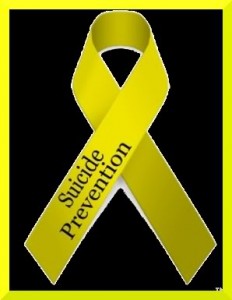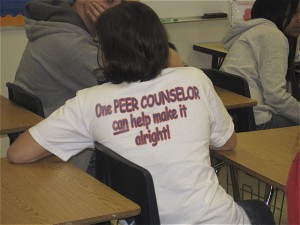Suicide is the second highest cause of death among college students and the third leading cause of death among young Americans ages 15- 24. Despite the increase in suicide prevention programs across college campuses in the United States, suicide continues to trend upward. A common complaint about college suicide prevention programs is insufficient and overworked health staff. Overburdened and case ridden mental health workers cannot be as effective in preventing or decreasing college suicide rates. In some instances they will not be able to adequately identify suicidal students, focus on individual cases, or do follow-ups. Regardless of the good intentions of staff, students in need of help will fall through the cracks. A prolonged wait list is a deterrent to students seeking mental help. This disincentive can sometimes mean the difference between life and death. Therefore, it is imperative that with these issues we take greater advantage of an underutilized resource: peer helpers.
campuses in the United States, suicide continues to trend upward. A common complaint about college suicide prevention programs is insufficient and overworked health staff. Overburdened and case ridden mental health workers cannot be as effective in preventing or decreasing college suicide rates. In some instances they will not be able to adequately identify suicidal students, focus on individual cases, or do follow-ups. Regardless of the good intentions of staff, students in need of help will fall through the cracks. A prolonged wait list is a deterrent to students seeking mental help. This disincentive can sometimes mean the difference between life and death. Therefore, it is imperative that with these issues we take greater advantage of an underutilized resource: peer helpers.
Peer Helper Programs- www.campussuicidepreventionva.org
University campuses are a rich resource of graduate and undergraduate psychology students. These students have the unique advantage of being able to tackle the issues from a peer perspective and take away some of the “professional jargon. Research shows that peers first seek emotional help from their peers. They will report thoughts of suicidal ideations first to a friend, peer, romantic partner or roommate. Peers interact on a more normal continuous level. Young people clearly have a powerful influence on each other. They are able to convey information and are quickly privy to information in a way that professionals are not able to. Peer helpers will be effective in tapping into issues which impact college students. Therefore, the question becomes: how do we encourage these peer helpers to become participants and become engaged in the problem?
Offer incentives to Peer Helpers
Peer helpers primary role is conveying information about suicide, through focus groups or rallies which, is an  important role. However, as it currently stands, peer helpers are underutilized. They can become more actively integrated and utilized in suicide prevention methods by filling a much needed gap in an insufficient workforce. Peer helpers if given the correct training, skills and capabilities would play a more significant role in suicide prevention. Peer helpers would not be replacing professional counselors but serving as gatekeepers on campuses. After all, peers play a primary role as confidant and supporter in each others lives. Correct training and skill capabilities automatically generates more assertion in resident interns or peer helpers seeking to offer support services to their peers. Peer helpers natural altruistic desire to help their peers is a resource which colleges should not hesitate to utilize.
important role. However, as it currently stands, peer helpers are underutilized. They can become more actively integrated and utilized in suicide prevention methods by filling a much needed gap in an insufficient workforce. Peer helpers if given the correct training, skills and capabilities would play a more significant role in suicide prevention. Peer helpers would not be replacing professional counselors but serving as gatekeepers on campuses. After all, peers play a primary role as confidant and supporter in each others lives. Correct training and skill capabilities automatically generates more assertion in resident interns or peer helpers seeking to offer support services to their peers. Peer helpers natural altruistic desire to help their peers is a resource which colleges should not hesitate to utilize.
A great way universities can attract and maintain more peer counselors is to offer incentives. Begin by targeting second to third year masters and PhD students. They can gain incentives by actively becoming involved in peer suicidal counseling, while undergoing additional training in suicidal counseling and prevention. This will be done under the close supervision of a certified practitioner which upon completion the student will be certified. Participation in these programs can go towards certain credit courses and be used either as an internship or practicum training.
Likewise undergraduate students can gain incentives by undergoing training and certification in suicide counseling and prevention. They too should be given incentives to use training towards practicum, internship, or as credit towards certain graduate courses. The incentive of certification and training through participation is a strong motivation for college students. The applicability of these skills to real life situation and future career enhancement is another great motivator. This will not only generate an increase in motivated peer counselors but create a future of certified experts, and a long term supply of invested peer counselors. Peer helpers who do not venture into suicide prevention as a career of choice; nonetheless possess a skill set which will be beneficial in other aspects of their lives.
Colleges can begin implementing these programs quickly and effectively by cutting through bureaucratic red tape. They already have internship programs in place and are aware of curriculums which can be supplemented by internship. It is just a matter of putting theory into practice and thinking outside the box. Informing students about program changes on campuses is highly effective through social media. However, professors disseminating information on incentives towards becoming peer counselors, is a sure way to answer questions and establish credibility. The inability to be creative and think outside the box and use a resource that is readily available at their fingertips is an opportunity that colleges cannot afford to lose.



2 pings